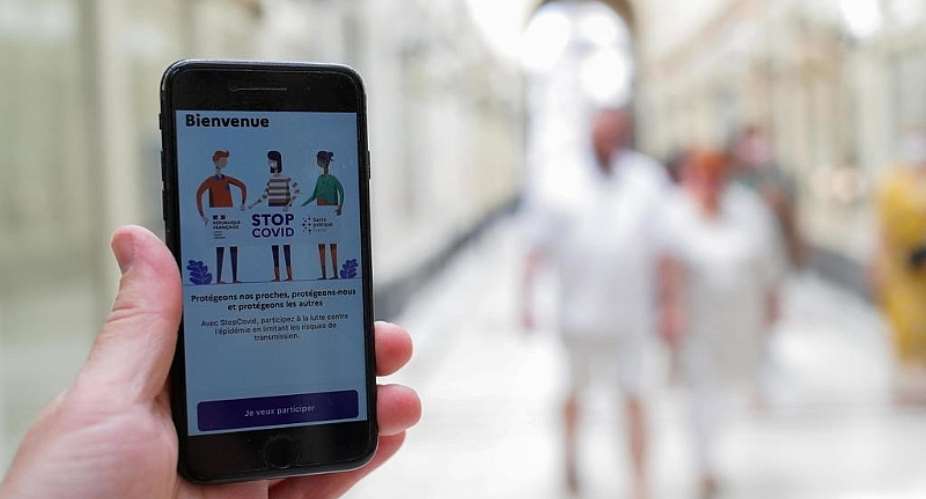France is to reboot its StopCovid contact tracing app, which has proved a failure since going live four months ago, while coronavirus infections across the country continue to hit record highs.
In an interview with France Info this week, Prime Minister Jean Castex revealed the government was working on a “new version” of the tracking tool, to be rolled out during school holidays on 22 October.
Mocked on social networks, StopCovid has been downloaded 2.6 million times since June – a paltry figure compared to 18 million downloads for similar apps in Britain and Germany. And it has managed to identify just a handful of potential contact cases.
Despite a strong government push for the French to get on board with StopCovid, the prime minister himself failed to download the app, which he mistakenly called TéléCovid – leading many to speculate this may be the chosen name of its successor.
Seeking support
While StopCovid is purely voluntary, its use needs to be widespread if the technology is to play any meaningful role in slowing the epidemic in France, where case numbers are hitting new records.
Digital Minister Cedric O admitted before the Senate last week the state-run tracker was “working badly”. The next version, he said, would require widespread support and a vote of confidence from the medical profession if it is to be successful.
O also indicated the app's budget would be increased from €100,000 to €200,000 per month, and that a call for tenders would be launched to find a project leader.
France to test controversial Covid-19 tracking app during lockdown exit
French app StopCovid still facing hurdles amid EU concerns about data access
StopCovid works by using Bluetooth to interact with nearby phones and detect when users come into contact with potential coronavirus carriers. It generates an anonymous numerical ID that's exchanged with other smartphones also running the app.
The ID of anyone who tests positive is red-flagged, and a warning is then sent to those who have crossed paths within a metre of an infected person. The app does not, however, reveal details about where and when the encounter took place – and geolocation data is not recorded.
Not just a tracking device
As well as functioning as a contract tracing tool, it's understood StopCovid 2.0 will operate as a "hub", gathering the latest government information on infections, sanitary measures and government advice.
However it remains to be seen exactly how the new version will work. Lingering questions – such as how the new app will differ from the original, and whether the existing centralised data protocol, called Robert, will be retained – will have to wait until the app is rolled out to the public.
Developed by research companies under the supervision of the government, StopCovid was criticised from the outset because of its incompatibility with other European applications that use a “decentralised” approach, meaning the contacts are stored in the phone and not on a central server. This added to concerns that the technology gives authorities too much power to exploit personal data.





 SSNIT must be managed without gov’t interference – Austin Gamey
SSNIT must be managed without gov’t interference – Austin Gamey
 Ejisu by-election could go either way between NPP and independent candidate — Gl...
Ejisu by-election could go either way between NPP and independent candidate — Gl...
 We never asked ministers, DCEs to bring NPP apparatchiks for returning officer r...
We never asked ministers, DCEs to bring NPP apparatchiks for returning officer r...
 No one denigrated the commission when you appointed NDC sympathizers during your...
No one denigrated the commission when you appointed NDC sympathizers during your...
 Used cloth dealers protests over delayed Kumasi Central Market project
Used cloth dealers protests over delayed Kumasi Central Market project
 A/R: Kwadaso onion market traders refuse to relocate to new site
A/R: Kwadaso onion market traders refuse to relocate to new site
 Dumsor: Corn mill operators at Kaneshie market face financial crisis
Dumsor: Corn mill operators at Kaneshie market face financial crisis
 Jamestown fishermen seek support over destruction of canoes by Tuesday's heavy d...
Jamestown fishermen seek support over destruction of canoes by Tuesday's heavy d...
 Election 2024: EC to commence voter registration exercise on May 7
Election 2024: EC to commence voter registration exercise on May 7
 Public schools rebranding: We’re switching to blue and white, we’re painting all...
Public schools rebranding: We’re switching to blue and white, we’re painting all...
